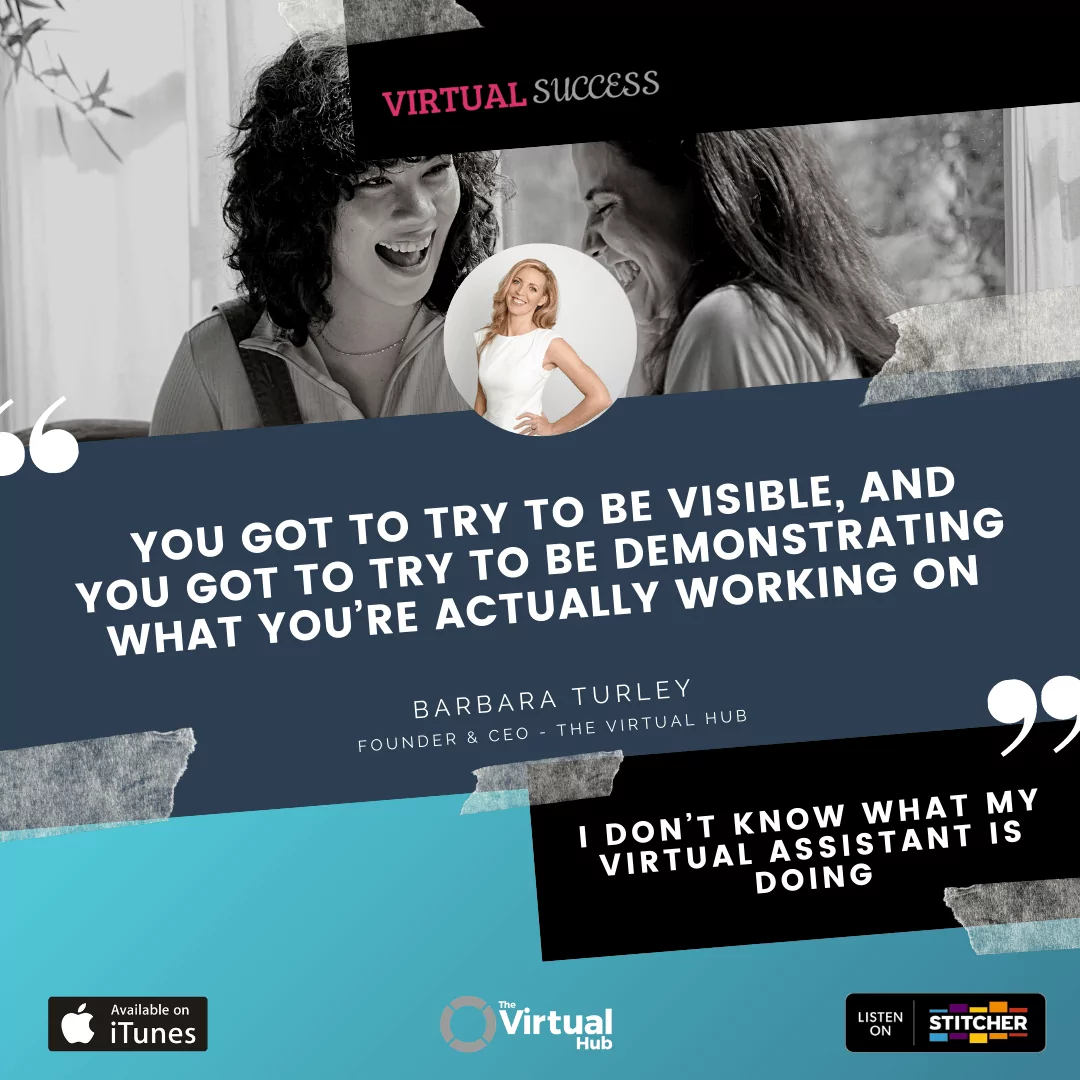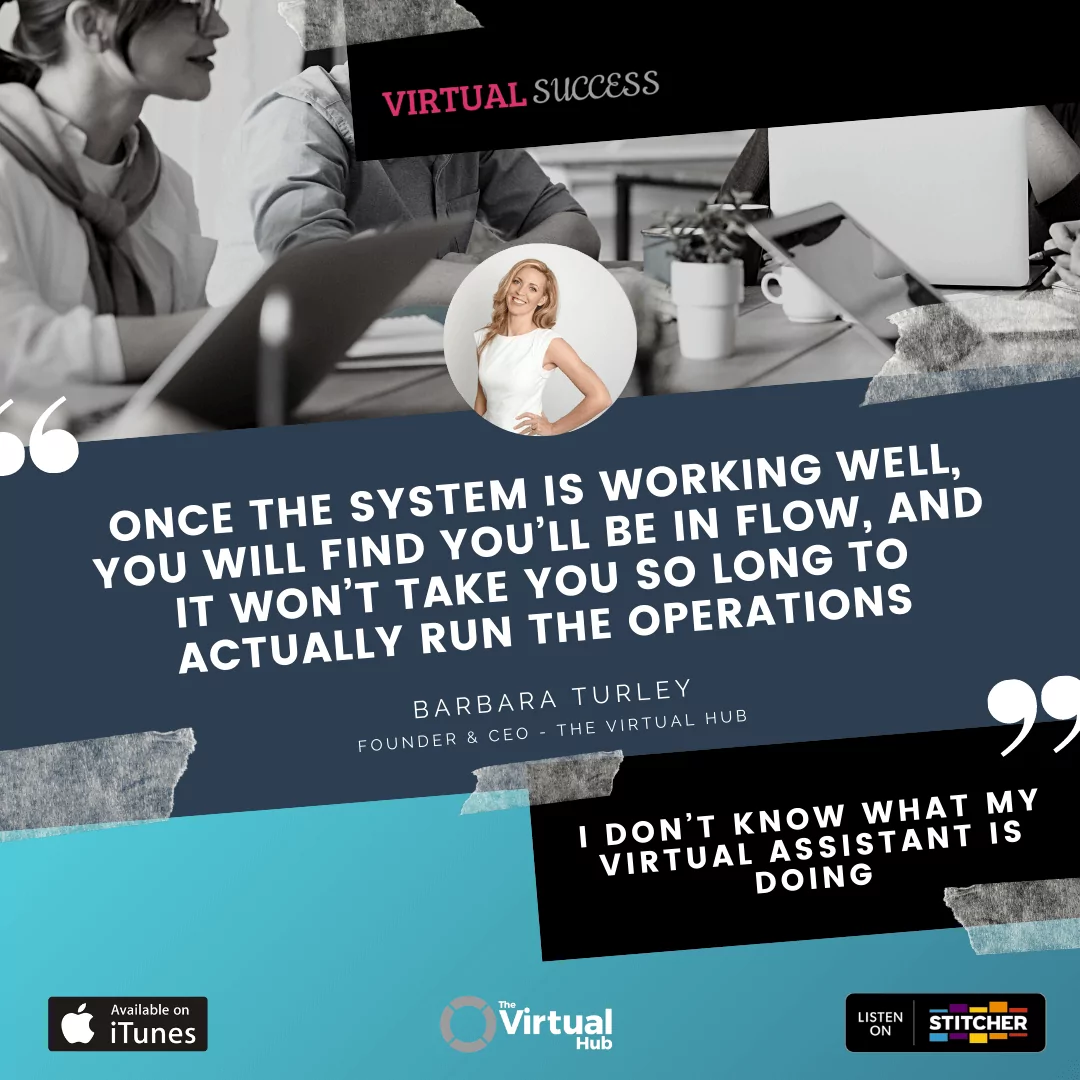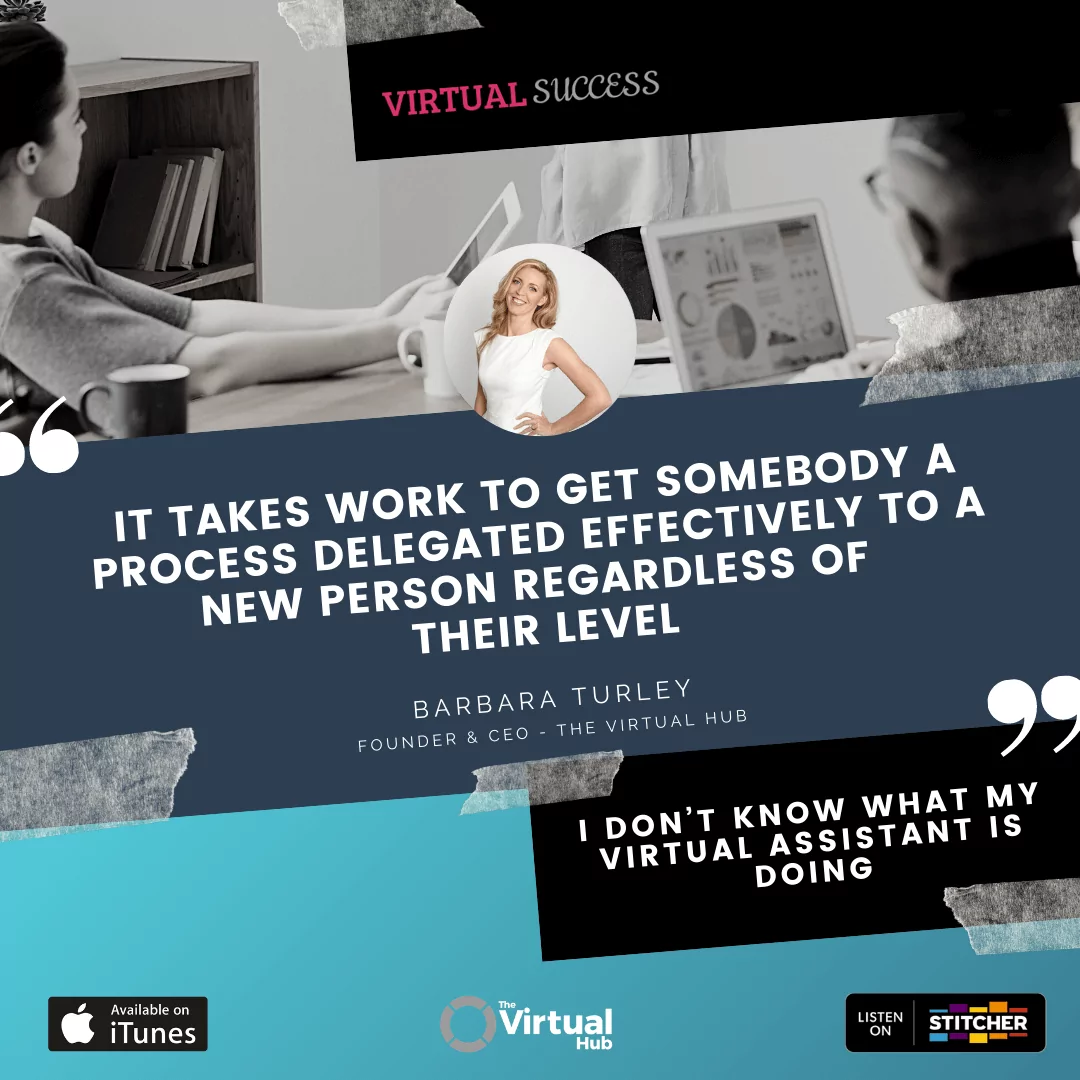I Don’t Know What My VA is Doing
Want the transcript? Download it here.
In this episode, Barbara and Matt talk to listeners about a common anxiety felt by many business owners who work with VAs – “I don’t know what my Virtual Assistant is doing” – and the strategies they can put in place to ensure they are always across tasks that their VA is working on.
During this episode, we take a look at the importance of communication and the setting of clear expectations within your team, to ensure that business owners and their VAs always know what each other is up to.
Some of the areas covered include:
- The importance of managing your team and flow of work
- Set clear expectations around what the deliverables are of each task
- How important project management tools are in keeping communication open and transparent
- Building solid systems within your business and ensuring you have the right systems and processes in place for your team
Let us know in the comments below what your key takeout has been from this episode or why not join the continuing conversation over in the Virtual Success Facebook Group.
In this episode:
01:36 – “What is my VA working on?”
02:17 – How do I manage my VA?
02:45 – Set clear expectations
03:57 – Use project management tools
05:50 – Keep communication open
06:58 – Set clear deliverables
08:09 – Build a solid system
10:58 – Have I got the right systems and processes in place?
15:15 – Working within your ‘genius’
17:08 – Refining your systems and processes
20:58 – Wrapping things up
Barbara Turley: Hey everyone, and welcome back to another episode of the Virtual Success Show where I’m joined by my fabulous co-host, Matt Malouf. Matt, how is it going?
Matt Malouf: Excellent, Barb. How are you today?
Barbara: I’m good. Thank you. Loving doing this show as always. I’m always amazed of how many times we think we have no more topics to cover. Then, we go, “What about this question?” So many things to talk about.
Matt: Absolutely, absolutely. We would come up with a list of I think half a dozen in the prep for this show.
Barbara: Exactly. I know. So, guys, what are the things we’re going to talk about today on today’s show? It’s a very simple topic, but it’s one I actually see quite a bit not just with clients, but people online talking about VAs, and the question that I get sometimes is… It’s not really a question. More of an observation or a fear. “I don’t know what my VA is working on,” which is a tricky one. So, people feel a little bit almost disempowered because they feel like, “Well, I think my VA is working, but I don’t actually know what they’re doing.” Now, Matt, is it just me, or do you hear anything similar in your coaching practice, right, your retreats, or any of your masterminds?
“What is my VA working on?”
Matt: Yeah. It’s very common. I hear, “I’m not clear or sure what they’re doing,” or it’s, “How will I know if they’re working all the time at their desk?” So, it’s very, very common. Very common.
Barbara: Yes. Yes, and I think what happens is people start to feel, like I said, a bit disempowered, and then the fear comes in, and I even talked to our VAs about this actually. I say it’s very important that you don’t let yourself fall into this trap because the client in the back of their head won’t be able to help themselves, but wonder, “What are they doing?” So, you got to try to be visible, and you got to try to be demonstrating what you’re actually working on.
How do I manage my VA?
But at the same time, it does… I feel it comes back to the client and the way the client is managing their team and managing the flow of work that’s going on in a business, which really is the responsibility of the owner or the person managing… You might have an operations person that’s managing this. It’s really their responsibility to know this kind of thing. So, Matt, what would you… As a coach, what’s your take on this? What’s your advice?
Set clear expectations
Matt: Yeah, and just to add to what you’re saying, I think that being clear on what their deliverables are is always going to put your mind at ease. That’s number one, but here’s some of the advice that I think around. It’s like the reality is whether you’ve got somebody working in your office, physically in your office or working from an overseas or a home office, like you got to get clear on what… Set reasonable expectations. Like if I’m sitting in an office environment, I’m not productive 100% of the time in the office. I’m not sitting there, working, jumping on every little task or every little email that’s sent to me, and I think what happens is when people, business owners and entrepreneurs using virtual assistants, when they’ll send an email and they don’t get an immediate response, they’re like, “What are they doing? They must be slacking off in a lot.”
Barbara: Yes.
Matt: Right?
Barbara: Yeah, we see that a lot. Yeah.
Matt: It’s like, well, hang on a sec… They’ve got to go to the bathroom as well, and they’ve got to have some lunch, and they got to grab a cup of coffee or whatever it is, right? So, I think first and foremost, it’s just being realistic with your expectations.
Barbara: Yeah.
Use project management tools
Matt: I think secondly with this is there are some really easy-to-use tools that can give you a degree of transparency on what’s going on, and I know two of these tools that, Barb, you and I talk about all the time. One is Asana and one is Slack.
Barbara: Yes. Yeah.
Matt: I think that any business owner using a virtual assistant, if you’re not using those two tools, then you’re setting yourself up to fail and struggle really.
Barbara: Yeah, and we’ve talked about that multiple times. I mean, for me, I fall into this trap myself with people where I’m thinking, “Yeah, that’s all just going a bit awry,” and I think what I tend to do in that sort of situation is go back to the leadership part of it and going, “Okay. I need to get my team together. I need to run through all the projects, the various deliverables that each one of them has on their list,” and then I need to start saying, “Let’s…” I mean, I meet weekly with them about this, so we talk about like where you at.
Again, the huddle concept. Where you at with the deliverable, with the milestone, and why are… If you’re stuck, why are you stuck? Are you waiting on someone else? Is your daily task list maybe too overloaded that you can’t get to it? But you have to keep… I sort of keep digging until I get the answer, and the answer might be that they’re slacking off, but in that sort of an environment, it’s very difficult for them to hide that, but you can get to the bottom of it and deal with it, and usually, you’ll find… I find somebody is overwhelmed or confused with something, and they’re either afraid to say it or they just haven’t gotten around to saying it yet, so you’ve got to create the environment where you can bring it to the table, and get it out in the open, and fix it, so that things get back in flow again.
Keep communication open
Matt: I think you raise some really, really good points. One especially then, Barb, that I think all listeners should really take note of is that they may be afraid to come to you, and my experience in dealing particularly with Filipino VAs is they’re a very compliant culture, they don’t want to say or do the wrong thing, so they’re more likely to say nothing than ask the question.
Barbara: Yeah, or they get into the vortex of, “Ugh, I’ll think about it tomorrow,” or, “Ugh, I’ll have another go tomorrow. I’ll try. I’ll try,” and then before you know it, three months have gone by and nothing happened.
Matt: Correct, correct, and I think so. So, I think part of the success map with working with a VA is asking the question regularly. I know in my meeting with my Philippines team, I actually opened the meeting with, “How can I help?” That’s the agenda. The agenda is not, “What are you up to? What are you doing?” “How can I help?” and that actually opens them up to communicate with me, and they even ran me through their list.
Barbara: That’s great. Yeah.
Set clear deliverables
Matt: Which I think a second point in what you just said too, Barb, is my experience is often when business owners and entrepreneurs are asking the question of, “What are my VAs doing?” It’s because they don’t have deliverables set up in a structured manner with project plans and lists.
Barbara: Yeah.
Matt: If you’re not clear on what they should be doing and when they should be doing it by, how can they deliver to what your expectation is? They don’t actually understand what it is.
Barbara: Well, they’ll degenerate… They’ll either start slacking off because they have nothing to do or the really conscientious ones that I find happens, they become… They have no direction, so they start trying to find things to do like researching things, and before you know it, all you’re getting back is, “I’m researching this tool or that tool,” and you’re thinking, “Is this really what I wanted?” So many clients avoid that. They just go, “Oh, okay,” and then what you find is they end up cancelling or firing the VA and going, “Look, I don’t really have any work for you to do,” which defeats the whole purpose of what you were trying to do in the first place.
Build a solid system
Matt: Yeah. Yeah, or the mantra will be, “VAs don’t work for me and my business.”
Barbara: Absolutely. Yes.
Matt: Which is not the case. It’s all a learning experience.
Barbara: Yeah, and it is this leadership thing. I think a lot of us… We all do it as business owners, as entrepreneurs. We want to get after the fun stuff, and the marketing, and the cool sales sort of end of things. We don’t really want to be bogged down in the operational side of things, so my view with operations is if you do have to do it yourself, if you’re early in business and you’re not yet able to put someone in for this role, the best way to get yourself out of it is to be very strict on processes, and communication channels, and reporting lines, reporting back to you on results, and you get a kind of a… It’s a whole system, and once the system is working well, you will find you’ll be in flow, and it won’t take you so long to actually run the operations.
Matt: Absolutely, absolutely. Barb, what’s your thoughts around when this… In your experience, when a client with a VA is feeling this way, what’s the first step you feel that they should do in order to stop feeling this way?
Barbara: Yes, that’s a great question because I find when they start to feel this way, it’s like an emotional vortex that you start to degenerate. You spiral into it, and as you do that, you become less and less able to have the conversation because it’s like the giant elephant in the room. Before you know it, you start avoiding each other, VA as well as you, and it gets to a point where nobody is really able… You lose sight of how it started if you let it go too long, and anyone listening who’s gone into this will know what I’m talking about.
So, the way not to go there is to, first of all, recognise this person works for you, right, so your job is to delegate and to give direction to them, so you got to call a meeting and start to revisit the task list. It could happen where you’ve come to the end of a project. I find this when it will happen. A project wraps up where everyone was really busy, and then there’s no clear direction of what they need to do after that, and it degenerates, so you got to call a meeting and revisit the task list.
Go over what your plans are, your strategic plans as a business owner for the following quarter, what you’re trying to achieve, and where they fit in, and what their new task list is, or some tasks may have gone stale, but they’re not really useful anymore, and they’re still doing it every day, but it’s not useful for your business strategy, so it’s… Again, you’ve got to sit down. You got to approach the subject, but don’t approach it from the “Are you slacking off? I think you’re slacking off.” mindset. Approach it from the mindset of, “Hmm, I think my people have lost their way potentially a bit. I need to step in and help them to come back on the path.”
Have I got the right systems and processes in place?
Matt: Absolutely, absolutely. For me, with this, to add to what Barbara is saying, I always think it comes back to, “Have I got the right systems and processes in place, and does my team know what my expectation around the implementation of those systems is?” I know in our business, whenever I’ve felt this way, and I think we’ve all felt this way about local or overseas team before, you know what I mean? Particularly, when you get their invoice and you pay it, you go, “What have they actually done for me?” But for me, it’s about, “Okay. Well, have I been structured in managing them? Have I been inspecting Asana and seeing that things are done in a timely manner? Am I ensuring that all of our tasks are getting into our project management system?”
One of the things that I did in prep for the show was telling Barbara that we do in our business. In our Slack channel, we have a channel called Stand Up, and every morning, the team come on, myself included, and you have to… By 10:00 a.m. Sydney time. We’re in Sydney. By 10:00 a.m. Sydney, you have to have put in there, “What’s my focus for today?” and you list out what you’re focusing on. It has to be a minimum of three things and, “Where I need help from others?” It’s a really easy tool that we use in order to keep that communication open. When things break down, I’ll often find that either I’m not posting in Stand Up or the team have started to drop off in posting in Stand Up, and so you’ve just got to come back to some basics with this.
Barbara: Yeah.
Matt: Very quickly, you can turn this around. You really can.
Barbara: Look. I think what I’d love to add to that as well, Matt. Like I love that idea of that Stand Up thing. I think I’m going to pinch that one because I’m not actually doing that idea, but it’s a very quick way of people checking in as well, especially when you’re virtual like, “Hey, I’m checking in for the day. It’s hi.” You know?
Matt: Yeah.
Barbara: One thing I want to express on this call is everything that we ever talk about like even this concept of, “I don’t know what my people are doing,” the reason I know for myself anyway that I passionately talk about it, and I come up with solutions for you guys listening is because I have felt the pain of it myself. As I was talking, I was going, “Yeah. Well, the reason I know this is because it has happened to me.”
Matt: Yeah.
Barbara: This is very normal. My business has grown. We’re up the hundred staff level now where I’ve got a lot of people reporting to me. There’s a lot of… Some of my reports have their own teams reporting to them, so it will happen at every stage that you grow. It’s starting to happen again to me now, and I have to now revisit all these strategies again and pull everyone in, rein the whole thing in and get everyone realigned again, but that’s my role. That’s my job to do that. It’s not their job to figure that out. It’s mine.
Matt: Yes, yes.
Barbara: Not to let them lose their way.
Matt: That’s it. That’s it. 100%. Here’s another really simple strategy or little tactic that everyone can employ particularly when you’re… Let’s say you’re in the first three months with a VA, and often, people will go, “Yes, I’m going to get somebody, bring somebody on. Do I have enough work for them? Not sure.” Then, you ask the question, “What are they doing?” Et cetera. So, what I do, any time this is happening for me, I put a little post-it note on my computer screen, which is, “What could I get…” and then insert person’s name, “To do right now?”
Barbara: Yes, great idea. You’ll come up with so many things business-related.
Matt: That’s correct. Right, and the thing here, what happens is because it’s staring at me, it means that what I’m going to do… As I go to do a task, could I get someone on the team to do it? Can I hand that over? Very quickly, you go from this mindset of, “Ugh, they’re not doing anything. Maybe I should get rid of them,” to, “Okay. There’s so many things that I have to do as an owner that I can get somebody else to do,” and you start learning how to delegate more things to them.
Working within your ‘genius’
Barbara: As you were saying that, Matt, I was just thinking to myself as well. I know for me this might not ring true for everyone, but for me, I don’t actually do that, but I have this kind of mindset that… I want everyone who’s listening to think about this. “What would my life look like and feel like if I was only working on growing the business and just delegate… like just having the…” Like all I do at the moment… I do a lot of the growth side of things, but mainly, on a weekly basis, I’m actually having huddles with the different teams and just guiding them in their roles. I’m not doing any of the doing, but I’m there as the guide.
When you make this work, that’s what it looks like. Right? That’s what it feels like, and you don’t end up doing all the busy work. You just have people to do it for you, but there has to be a commitment to getting to that level, and the commitment is to just… You shouldn’t be doing any of the doing, so if there is any doing that you are doing, you need to learn to offload that somehow, depending on the type of business you have but… and VAs. It takes work to get somebody a process delegated effectively to a new person regardless of their level of… their level in the business. Whether they’re a VA or an ops manager, whatever. It still takes time. But when you commit to doing that, like eventually, in 12 months’ time, your business is going to look totally different than it does today, and so with your life.
Matt: It’s interesting what you bring up, Barb. In my book, The Stop Doing List, I call it your ‘genius’.
Barbara: Yes.
Matt: When you understand what your genius is, and they’re the things that you’re really good at, you love doing, and have a positive financial return to you and the company, and you understand that 60% to 70% of your time needs to be spent there, all of a sudden, there’s plenty you need to stop doing and can delegate to somebody else.
Refining your systems and processes
Barbara: Yeah. I mean, even these podcasts. I’m sure loads of you guys listening to this have dreams of having a podcast or have a podcast that’s hit and miss, or doesn’t really happen, or takes up all your time. Honestly, Matt and I just record. That’s all we do, and the VAs do everything else. They manage the whole… because we have a process. We’ve developed our own… There’s a system, and they all know what they’re doing, and everyone has a deadline, and we hold them to that, and it shows up online on time.
Matt: Yeah.
Barbara: But that’s because we lead it, and we have developed that, and we have delegated it, and we’ve worked hard to get it to work so that we don’t have to do that. We just do the fun bit, which is this bit.
Matt: Absolutely.
Barbara: This convo.
Matt: It’s an interesting example you bring up because as soon as we finish this, literally, we’ll extract the file. It will go into a Dropbox, but then it’s triggered in Asana that that is there, and all of a sudden, a templated process is then put in place for that show, and so this is where all of a sudden… Barb and I don’t have to wonder what’s happening or what our team are doing because we can just log into Asana and observe through that tool what’s going on.
Barbara: Oh, and actually, I’m going to add a point there that’s very important to this, “I don’t know what they’re doing,” thing. So, the one rule we do have is that yes, there’s a process at the background, but it’s not just in the ether. It’s in Asana as Matt said, and each of the people as they do their bit and bits, and it moves forward in the process, they have to update Asana.
Matt: Correct.
Barbara: So, that’s the reporting back bit, so we know, “Is something on track?” or we can quickly say… I mean, we don’t even look at it these days, do we, Matt? But we could see pretty quickly if something was derailing.
Matt: Exactly.
Barbara: The team would let us know. The team would be like, “Hey, guys. There’s a problem with the edit. We’re going to miss the deadline.”
Matt: Yeah.
Barbara: So, I think that’s… Yeah, it’s a commitment in the beginning to being heavily involved so that it does work, and then making sure that everybody understands their role, the system. Then, you never have to wonder what your team are doing.
Matt: Yeah. I’m going to overlay one last thing on this. We did some shows very early in this podcast, Barb, on communication.
Barbara: Yes.
Matt: If you’re not communicating effectively and consistently with your VA, then you will be sitting there wondering what they’re doing. Barb called it a daily huddle. I gave the Stand Up in our Slack channel. It’s all communication, so rather than us having to sit here, and wait, and wonder, we’ve got proactive mechanisms in place so that we’re always made aware.
Barbara: Yeah.
Matt: I think this question around, “I wonder what they’re doing,” is often solved through communication.
Barbara: Well, and yes, and saying that if you have that question in your head… I mean, let’s say you’ve got a good person. It’s probably not the VA or your team because this can happen across a whole team. It’s the system you have in place for making sure that you don’t have to ask that question.
Matt: 100%
Barbara: That’s what it comes back to again, so again, that’s your job as an entrepreneur, a business owner, whatever to set the system up in place. As you always say, Matt, systems run your business. People run your systems.
Matt: Yes.
Barbara: You build the systems and then delegate it to your people, and that … I mean, that in itself is a rock solid business right there.
Matt: 100%. 100%.
Barbara: Gosh, I even… It’s funny. I even learn things myself from just us chatting together, and I think I’m writing little notes going, “Yes, I need to do that one,” and it’s this constant evolution and refining of little tips you pick up along the way. Just put them in place. Keep working at it. Keep evolving, and keep moving forward with all of this. Eventually, you build something that’s very robust.
Matt: Absolutely.
Wrapping things up
Barbara: So, thanks, Matt.
Matt: Oh, thank you, Barb. It’s been good fun. It’s been good fun, and if you’ve enjoyed this show, please, we’d love… We want to build an amazing community of people that we can help in this area, so we’d love for you to share it or give us a review on the show. Also, we have a Facebook group where you can jump on and ask us questions, and we can answer those or even potentially get you on and interview you on the show in order to answer that question.
Barbara: Absolutely, and I know there’s lots of you. I get feedback that there’s a lot of people listening, so for those of you who have connected with us, yeah, make sure that you share and ask us anything, and no question is too silly because even the smallest questions produce the best shows like this one.
Matt: Exactly. Well, Barb, it’s been fun again.
Barbara: Yup. See you on the next show.
Matt: See you then.
The Hosts
 Matt Malouf
Matt Malouf
Matt Malouf is a passionate business coach, speaker, author and entrepreneur on a mission to help entrepreneurs around the world break the shackles of mediocrity and reach new levels of personal and business success.
 Barbara Turley
Barbara Turley
Barbara Turley is the Founder & CEO of The Virtual Hub, a company that specializes in recruiting, training, and managing superstar ‘Virtual Assistants’ in the social media, digital marketing, and systems automation space.





 Matt Malouf
Matt Malouf Barbara Turley
Barbara Turley